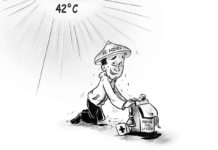
EARLY this month the World Health Organization (WHO) ended COVID-19’s status as a public health emergency of international concern. This has been in place since January 30, 2020 so understandably there was a collective sigh of relief from people of all nations, including here in the Philippines whose lives have changed drastically while dealing and living with with the virus.
Even I can’t help but recall the early days of the pandemic when I was infected, got very sick and was hospitalized. It was in the middle of March 2020 and at the time, there was little information about the virus and people were succumbing to it on a daily basis. I consider myself very lucky to have hurled that ordeal and will constantly be grateful to God, my family and friends who supported me and kept me strong and most importantly, to the health workers who took care of me and every other patient confined at the hospital in spite of the extreme risks on their own health and safety.
Department of Health (DOH) Officer-in-Charge Maria Rosario Vergeire was quick to clarify that what the WHO did was only to lift the public health emergency of international concern status of COVID-19 and not a declaration that the pandemic is over. The announcement of the WHO did not come as much of a surprise anymore– our economy is back on track, our doors are open again to tourists and most of the businesses are back to pre-pandemic operations.
From January to March 15 this year, the Department of Tourism recorded 1.15 million international tourist arrivals—boosting its confidence of hitting its year-end target of 4.8 million. This is almost a half of the 2.65 million total international tourist arrivals in 2022 that was equivalent to P214 billion in revenues.
There is ample reason for optimism in the country but from what we are seeing as far as new infections of COVID are concerned, we cannot afford to let our guard down. The DOH reported 12,414 new cases last week, representing a 31 percent increase in daily infections. The total number of active cases now stands at 15,895, the highest tally in four months. The utilization rate for intensive care unit beds for COVID patients is at 18.8 percent while the non-ICU bed utilization rate was at 21.7 percent. In the past two weeks, the region with the most number of new COVID-19 cases was the National Capital Region, followed by Calabarzon, Central Luzon, Western Visayas and Bicol.
It appears that the current rise in the number of new cases has something to do with the new omicron subvariant named Arcturus, which experts have described as being able to evade immunity and is more contagious than the previous variants. OCTA Research says the positivity rate in the country is now at 23.6 percent and that this could go up to 25 percent in Metro Manila. However, the organization did note that it does not expect health care utilization to reach critical levels.
Clearly COVID is still a threat to many of us but the effects are no longer as bad as the early years and a lot of this can be attributed to the vaccination of many of our population. Many people are still getting sick now but in most cases, what they have experienced is somewhat similar to the common flu. We steered the passage of Republic Act 11525 or the COVID-19 Vaccination Act of 2021, which facilitated the procurement and rollout of the nationwide inoculation of our people against the deadly virus. During a hearing of the Senate Blue Ribbon Committee last week, Vergeire noted that the number of wasted COVID-19 doses could reach 60 million by September unless the government ramps up its vaccination program. She said vaccination rates remain low in the provinces and that the country as a whole has an average of 46,000 Filipinos getting vaccinated in a week. Vergeire also disclosed that there are even fewer people getting booster shots now.
We cannot afford to be complacent and let our guards down. For those who are still unvaccinated or who have not yet received their booster shots, take the opportunity to get yourself protected. We should also continue to observe the basic health protocols that we have learned to live with over the past three years. This includes wearing face masks when we’re not feeling well or if we are at crowded areas or confined spaces. These are but just minor inconveniences that could very well help in preventing the further spread of COVID or worse, the possibility of the imposition of stricter health protocols—a situation no one wants to see or experience anymore and one that we can no longer afford to have at this time.
***
Sen. Sonny Angara has been in public service for 18 years—9 years as Representative of the Lone District of Aurora, and 9 as Senator. He has authored, co-authored, and sponsored more than 330 laws. He is currently serving his second term in the Senate.
***
Email: sensonnyangara@yahoo.com| Facebook, Twitter & Instagram: @sonnyangara/PN



